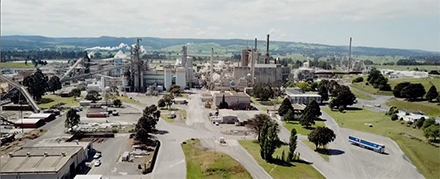The Victorian Government has only supplied 15%-20% of its promised wood pulp commitment to Opal Australian Paper over the past 13 years, the Government has admitted. Source: Philip Hopkins for Timberbiz
The figures were tabled in State Parliament by the Minister for Agriculture, Gayle Tierney, in response to a series of questions from the Independent Member for Morwell, Russell Northe.
The Government’s 1996 agreement requires it to supply a minimum of 350,000 cubic metres of pulpwood each year between 2010-11 and 2029-30 to the Maryvale pulp and paper mill.
Australian Paper’s 2018 Sustainability Report shows that the Maryvale mill bought 1.65 million tonnes of pulp wood for its operations; 68% was supplied by Hancock Victorian Plantations and 26% from VicForests, with hardwood residues from sawmills making up the remaining 6%.
Ms Tierney told Parliament that after the 2009 bushfires, the government reduced the annual supply of ‘mountain forest’ pulpwood (mountain ash or alpine ash) to 265,000 cubic metres.
“The government continues to supply approximately 50,000 cubic metres of mixed species pulpwood under the agreement,” she said.
In June 2020, the agreement was varied to allow silvertop ash to be substituted for mountain forest pulp log. Silvertop ash is classified as ‘mixed species’ timber.
Ms Tierney said the variation provided for a proportion of up to 40,000 cubic metres of mountain forest pulpwood to be substituted with silvertop ash for the period 2019-21 to 2023-24 inclusive.
“A number of other clauses in the agreement allow for variations,” she said. VicForests manages the supply of pulpwood to the Maryvale mill on behalf of the Victorian Government.
Mr Northe pressed for information on which forest areas supplied the timber, but Ms Tierney said the specific details of VicForests’ supply to the mill, including volumes and prices for supply from different forest management areas, were “commercial-in-confidence”.
Queried on the impact a shortfall in supply would have on Maryvale, Ms Tierney said Opal was continuing to liaise closely with many of its suppliers, including VicForests and Hancock Victorian Plantations, “to successfully maintain its operations”.
Mr Northe pushed for information on the impact of third-party litigation on native timber harvesting over multiple decades.
“Third parties have taken legal action under the Code of Practice for Timber Production 2014 as well as earlier versions of the code,” Ms Tierney said.
“In 2021 and 2022, the government varied the code and the Conservation, Forests and Lands Act 1987 to create greater certainty regarding the implementation of the code. Further public consultation has taken place on additional amendments to the code that will come into effect in 2022.”
Queried on what impact the litigation was having on direct and indirect jobs for forest contractors, Ms Tierney said contractors experiencing difficulties with stand-downs due to litigation “are encouraged to contact VicForests regarding the temporary support that is available for their businesses and their workers”.
Ms Tierney acknowledged that VicForests successfully appealed against the Federal Court’s May 2020 decision in favour of the Friends of the Leadbeater’s Possum action against VicForests.
“As other matters are currently before the Courts with judgement reserved, I will not make any further comment,” she said.
Mr Northe asked what the Government was doing to ensure supply in the face of unsuccessful litigation. Ms Tierney said it was difficult to quantify the impact of unsuccessful legal actions, which typically involve temporary injunctions that are subsequently lifted.
“VicForests updates its harvesting methods and locations regularly in response to new research findings, bushfires and other events. Legal cases also consider changes in the harvesting environment,” she said.
“As such, it is difficult to recreate the baseline scenario in which third-party litigation did not occur and coupes were harvested in a substantially different order over an extended period of time.
VicForests has worked closely with contractors to minimise employment impacts.”
Forest contractors in Gippsland have currently no work and two mills in East Gippsland are running out of timber due to legal action by environmentalists and decisions by the Supreme Court.








